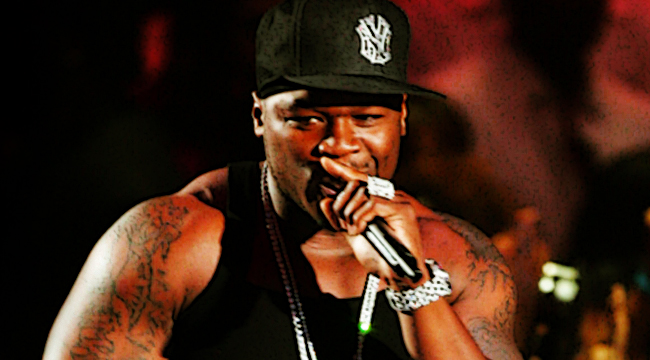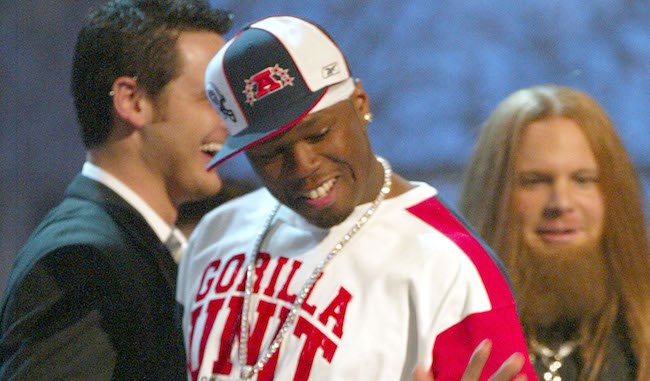
On February 8, 2004 the stage was set for Curtis Jackson’s coming out party. The 46th Annual Grammy Awards at Staples Center in Los Angeles seemed ready to become 50 Cent’s coronation, as the controversial rapper was nominated for five awards, including the prestigious Best New Artist award and with the previous year’s No. 1 song and No. 1 album. It was all but assumed he’d take home a few trophies.
50 Cent didn’t win any Grammys that night. Not even one.
No matter how massive his album Get Rich Or Die Tryin’ and smash single “In Da Club” were in 2003, they didn’t buy him any gold gramophones that night. It was a shock, and apparently left 50 miffed because when he lost Best New Artist to a rock band from Little Rock, Arkansas named Evanescence, he walked onto the stage to interrupt lead singer Amy Lee’s acceptance speech.
Granted, Evanescence had a massive 2003 of their own, with their debut album Fallen finished at No. 8 on Billboard’s year-end list, and the group notching two Top 10 hits on “Bring Me To Life” and “My Immortal.” But they had an even bigger 2004 after their win at the Grammys, with Fallen finishing at No. 6 on Billboard’s 2004 year-end list, and the Best New Artist award helping propel the album to another 2.6 million copies sold in 2004.
Thanks to the Justin Timberlake and Janet Jackson wardrobe malfunction at Super Bowl XXXVIII just a week earlier, the show was broadcast on a five-minute delay, but 50’s walk to the stage still made the broadcast. Lee watched, baffled, saying “Oh what did I do?” but 50 didn’t grab the mic, or say anything, instead choosing to just smiling and make his presence felt.
In fact, 50 never spoke at the 46th Grammy Awards, not even once. The man with the biggest song and album of the year before didn’t have his voice heard one time during the Grammys. But silence is deafening, and once again, and 50 Cent’s silence in 2004 was yet another example of one of the Grammy Awards’ greatest flaws, their longstanding reluctance to acknowledge and celebrate the world’s most popular genre of music: Rap.
Since the Grammys began including rap on their show, they’ve been ignoring the genre. In 1989 the Grammys added their first rap category, Best Rap Performance, but after word leaked to Def Jam CEO Russell Simmons that the award wouldn’t be a part of the televised show, nominees DJ Jazzy Jeff and Will “The Fresh Prince” Smith, Salt-N-Pepa and LL Cool J boycotted the show, as did others like Slick Rick and Public Enemy. Kool Moe Dee, a nominee for the award, did show up and shouted out the rappers who boycotted in a freestyle rap as he presented an award.
The next year the Grammys broadcast the award, and 1989 winners Jazzy Jeff and The Fresh Prince were invited back to the to the show to perform. The duo performed their track “I Think I Can Beat Mike Tyson” and dedicated their performance “to all the rappers last year that stood with us and helped us to earn the right to be on this stage tonight.”
In 1991, MC Hammer made history by becoming the first rapper ever nominated for Record Of The Year, but Hammer lost and to date a rapper has never won a Grammy for Record Of The Year. A rapper has never won a Grammy for Song Of The Year either, and no rapper was even nominated for that award until Eminem was for “Lose Yourself” in 2004. The 46th Grammys in 2004 was a landmark affair for rap in many ways, as that was the first time a rap album ever took home the Album Of The Year award, when Outkast nabbed the trophy for Speakerboxxx/The Love Below, just moments after 50 took the stage to protest his loss.
Popularity is no longer a hindrance for rap, and can’t be the Grammys’ excuse. In 2017, rap finally passed up rock as the music world’s most popular genre, with eight of the ten most listened to artist in 2017 coming from the R&B or hip-gop world. The Grammys have chosen to largely ignore the genre for major awards, save for a few random exceptions. Undeniable legends like Tupac, The Notorious B.I.G., Nas, Snoop Dogg, Ice Cube, A Tribe Called Quest, MC Lyte, N.W.A, Run-DMC and Public Enemy have never won a Grammy. Modern superstars like Future, J. Cole, Nicki Minaj and Rick Ross have yet to take home trophies either.
The Grammys have developed a troubling view of rap that plagues even some of the artists who have emerged from the genre. The likes of Pharrell, Kanye West and Tyler The Creator have talked at length about growing past rap, looking to dabble in other forms of music to expand their horizons. The tone is condescending, as if rap is a lesser form of art, and moving on to pop, or film scores represents artistic growth, not laterally, but vertically
“I hate rapping,” Tyler said in a in a 2014 interview with Larry King. “It puts you in this box… People look at you different like ‘Oh, he’s a rap artist. That doesn’t take much talent.’ I’m pretty bored with it. (Rap) isn’t interesting. I want to do films. I want people to mention my name next to Wes Anderson or Quentin Tarantino. I don’t want my name to be mentioned next to other rappers, at all.”
It seems that the Grammys view rap in the same scope, as a form of music not worthy of their highest honors, or even being mentioned in the conversation. Back in 2016, when Kendrick Lamar’s To Pimp A Butterfly was being hailed as an artistic masterpiece, he was shut out of the major awards, taking home only the rap awards despite a record eleven total nominations.
But viewing rap music as a lesser form of art when compared to other genres is dead wrong. Rap’s mere inception is a stroke of genius, an act of spontaneity as DJs mixed records at block parties. Rap, almost since its beginning stage, has always been the most malleable music genre, constantly shifting and changing, forcing its artists to adjust on the fly to remain relevant or risk fading into obscurity. Those at the absolute peak of the genre do just that, either adjusting to new trends, or creating the trends themselves, remaining afloat a competition arrives seemingly by the second.
For over 40 years, rap has shifted over and over, constantly reinventing itself and redefining what constitutes for rapping. From the rudimentary flows of the earliest rappers, to the melodic warbling and crooning of the new age, the artistry in rap has always been on display. Whether it’s the pseudo-spoken word, or the collaboration with producers on instrumentation, sampling and crafting records, or the approaches to vocalization on music that has revolutionized music as we know it, not only is rap as artistic as any other genre, it’s also breaking the ground for other genres to tinker with the same types of experimentation.
Since the earliest days of rock, black music has been appropriated, cleansed and retooled to be more easily consumed for mass audiences. Whether it’s Elvis covering Big Mama Thornton or Miley Cyrus twerking and leaning heavily on Mike Will Made-It for the biggest album of her career — and her only Grammy nomination — all that appropriation is cut from the same tapestry of black music, and lives on in today’s rap. So to pretend that rap music isn’t worthy of the prestige of the Grammys is an indictment of music as a whole, and a irresponsible neglect of the genre that helps shape nearly every other genre of music. To ignore rap is to ignore music as a whole, and a failure of the Grammys’ stated mission to being “the premier outlet for honoring achievements in the recording arts and supporting the music community.”

So, yes, 50 went on stage and pulled a slight Kanye for himself, miffed that he didn’t win an award he felt he deserved. But, he did it for an entire culture as well. Rap needs to be respected, and his presence that night demanded it. Over a decade later, rappers are still fighting for their respect, still watching other artist win awards they feel belong to them.
But now, as the genre is the most popular genre in all of music, maybe it’s finally time all of those rappers get their just due. Or, maybe it’ll be the status quo all over again, and “Despacito” and Bruno Mars will take home awards that I believe Kendrick Lamar or Jay-Z deserve. But if rap does finally prevail in the big three awards, maybe 50 Cent will be somewhere smiling, enjoying the moment he had a hand in creating all with one quick stroll onto the stage that he deserved, but wasn’t awarded.






